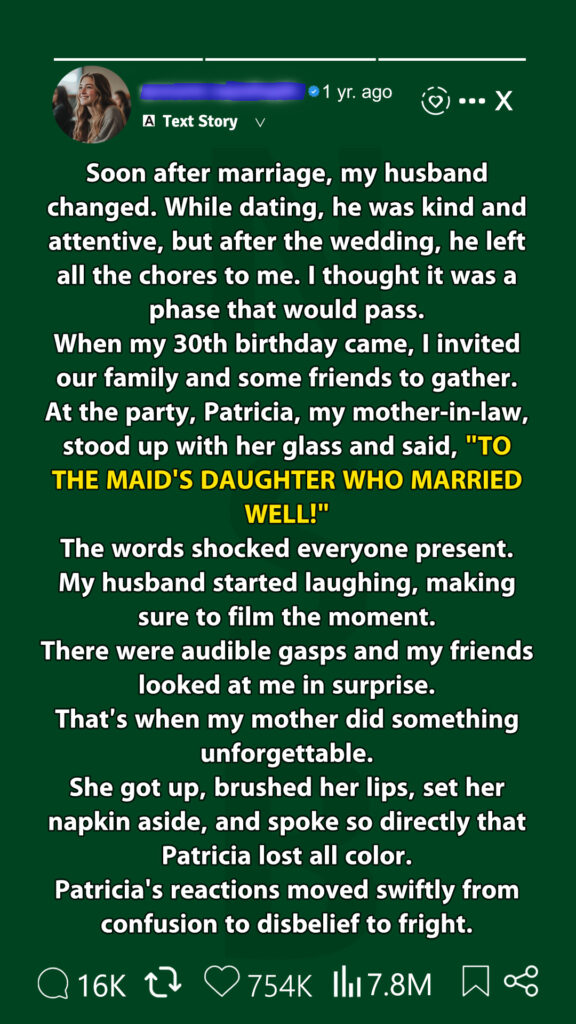I never imagined my 30th birthday would become the stage for a public humiliation—and an unforgettable act of grace. What was supposed to be a celebration of love, growth, and family turned into a moment that revealed the cracks beneath the surface of my marriage. And the woman who saved me? My mother. The same woman my mother-in-law tried to shame.
I’m Elise. Editor. Wife. Daughter of a housekeeper. And proud of it.
I met my husband, Andrew, at a university mixer. I was exhausted, overworked, and running on caffeine when I spilled coffee on his blazer. He laughed instead of scolding me. That laugh became the soundtrack of our courtship. He was kind, attentive, and made me feel seen. When he proposed, I said yes without hesitation.

But I didn’t realize I was marrying into a family that saw me as a project—not a partner.
Andrew’s mother, Patricia, is old money. She speaks in silk and walks like she owns the air. From the beginning, she made it clear: I was beneath her. She never said it outright—but her tone, her glances, her questions (“What does your mother do again?”) were daggers wrapped in pearls.
Still, I tried. I smiled through her condescension. I invited her to dinners. I sent her birthday cards. I believed love could soften her edges.
Then came my 30th birthday.
We hosted a garden party—fairy lights, soft jazz, laughter floating through the air. My mom wore her best dress, the one she saved for special occasions. She looked radiant. Nervous, but proud.
Halfway through the evening, Patricia stood to make a toast. She clinked her glass, smiled at the crowd, and said:
“To Elise—the maid’s daughter who married well.”
Silence.
Andrew laughed. Filmed it. My heart dropped.
I looked at my mom. Her face was calm, unreadable. Then she stood.
She didn’t raise her voice. She didn’t cry. She simply said:
“Thank you, Patricia. You’re right—I was a maid. I scrubbed floors so my daughter could walk into rooms like this. I folded sheets so she could unfold her dreams. And I raised her to know that dignity isn’t defined by wealth—but by how you treat others.”
The crowd erupted. Not in chaos—but in quiet awe.
Patricia turned red. Andrew stopped filming. My mom sat down, took a sip of her drink, and smiled at me.
That moment changed everything.
I saw my husband differently. He hadn’t defended me. He hadn’t flinched. He’d laughed. And that laugh, once comforting, now felt cruel.
Later that night, I confronted him. He said I was “overreacting.” That Patricia was “just being playful.” I realized then: I’d married a man who didn’t understand the weight of words. Who didn’t see the strength it took for my mother to raise me alone, with grace and grit.
I didn’t leave him that night. But I started building the courage to.
My mom taught me that silence isn’t weakness. That sometimes, the most powerful response is calm truth. She didn’t just defend me—she reminded me who I am.
I’m Elise. Editor. Wife. Daughter of a housekeeper. And proud of it.


